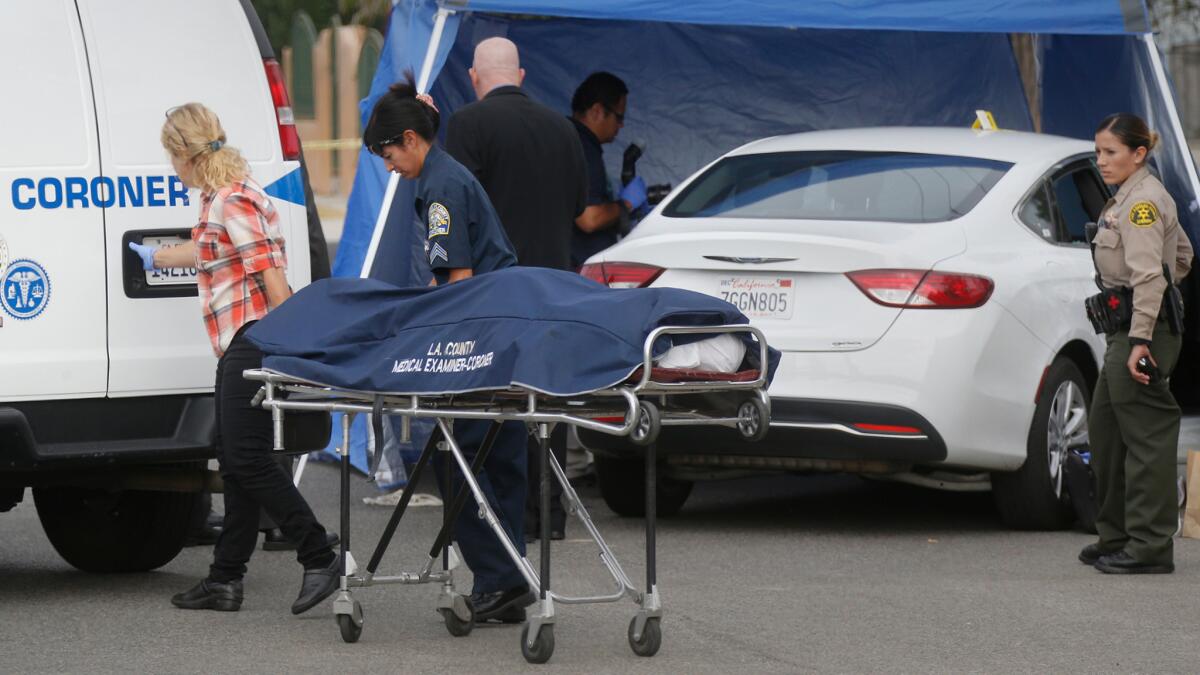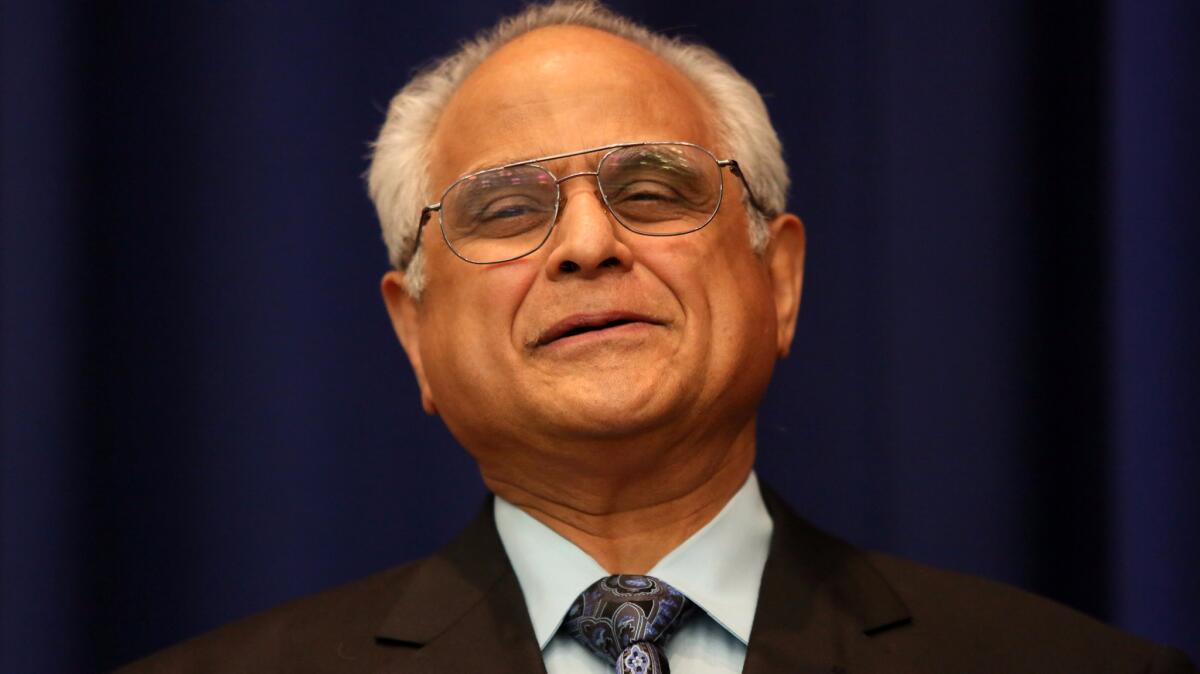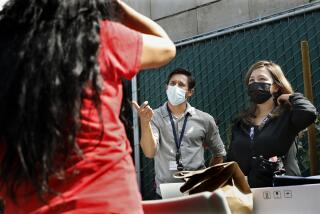Massive L.A. coroner backlog comes at a price for loved ones of those lost

It was a sweltering day in Pomona in August 2015 when Katie Dix collapsed during a rave at the Los Angeles County Fairgrounds. She went into cardiac arrest and died at a nearby hospital.
Dix’s family expected that an autopsy and lab tests would take a few weeks, but as months went by they grew frustrated and angry. Her relatives would call repeatedly, only to be told: “Next month.”
“It was excruciating for her parents,” said Lee Sherman, the family’s attorney. “It is horrible enough to deal with your child’s death — the reports, the speculation. They just wanted answers.”
Finally, in February, the coroner released results showing that the 19-year-old Cal State Channel Islands student died of multiple drug intoxication. The effects of consuming Ecstasy had been worsened by the scorching heat.
Dix’s case was part of a backlog at the Los Angeles County Coroner’s office affecting hundreds of cases. The delays have threatened the office’s accreditation and sparked a frantic effort to fix the problems. They have also frustrated law enforcement officials, who use the autopsies to help build criminal cases.
Officials blame staffing and budget shortages, broken equipment and the difficulty in recruiting and training highly skilled employees.
A few weeks before Dix’s cause of death was finalized, then-Chief Medical Examiner-Coroner Mark Fajardo abruptly quit, saying he had not been given enough resources to do the job properly. At that point, about 180 bodies awaiting autopsies were stacked up in the county morgue.
Since then, the coroner’s office and other county departments have taken aggressive steps to shorten delays and attempt to save the agency’s accreditation with the National Assn. of Medical Examiners. Staffing has been increased, some tasks have been outsourced and other improvements have been made, but lengthy delays remain, records show.
As of Sept. 21, toxicology and other tests had not been completed on more than 1,500 bodies — an improvement over June, when the figure was 2,100.
The coroner’s office is still running behind the standard established by the National Assn. of Medical Examiners, which says that work should be completed within 90 days in 90% of cases. In 2015, L.A.’s coroner completed 81% within that window; the rate dropped to 78% between June 2015 and June 2016.
Currently, nearly 1,500 cases remain incomplete after 90 days, including roughly 570 that have lingered for more than 150 days.
Officials say that as the department increases staffing, they expect to clear the toxicology and autopsy backlog.

“We are making meaningful progress in several key areas, including toxicology testing and time elapsed between autopsy and release of the body,” Dr. Lakshmanan Sathyavagiswaran, the interim chief medical examiner, said in a letter to The Times. But, he added, because the county is “working toward lasting solutions — not just quick fixes — our progress may not always be as swift as we would like.”
The coroner’s office is hiring 22 new employees, funded in part by a $2.5-million budget increase from the Board of Supervisors. The budget is now $40.66 million.
But the delays remain a painful problem for the deceased individuals’ families, who say they are left waiting for crucial information needed to investigate criminal matters, settle financial affairs or pursue civil lawsuits.
On Oct. 1, 2015, Ryan Joseph Greenberg, 32, was found dead in an apartment in North Hills with a gunshot wound to the head. Greenberg had been addicted to crystal meth for years and was living on the streets before his death, said his sister, Stacy Klinger, 42.
Seeking a copy of the autopsy report, Klinger said the coroner’s office told her the toxicology tests would take four months.
Klinger said that family hopes the report might help police find her brother’s killer. But more than that, she said, the situation left unanswered questions for her family.
“It’s just one other thing to finally get some closure,” she said.
More than 10 months after Greenberg’s death, Klinger finally got the autopsy report and toxicology results showing meth and alcohol in his system.
In February, tossing aside the usual protocol, a sheriff’s homicide sergeant took a county coroner’s manager to task over the huge backlog in toxicology results, saying criminal investigations and prosecutions were being held up.
“Our bureau has had numerous questions from the district attorney’s office, and as of this morning, from the presiding judge of Compton court on the current delay with toxicology results,” Sgt. Shannon Laren wrote in an email.
In response, the coroner’s then-interim chief of forensic labs, Margaret Kaleuati, said, “Every month, we receive more than 400 new cases,” but cannot keep up because of short staffing and the breakdown of one of the machines used to process the tests.
The coroner’s office’s accreditation with the National Assn. of Medical Examiners was due to expire Aug. 24 but remains active pending an inspection Oct. 17 and subsequent report. To keep its full, five-year accreditation, the office must meet the 90% clearance within 90 days threshold. However, an office with some shortcomings can receive provisional accreditation for a year. Earlier this year, coroner’s officials spoke as if the loss of the accreditation was a foregone conclusion.
In a budget request for five more senior criminalist positions, coroner’s officials wrote, “Without these positions, the department would fall further behind in handling its massive existing backlog of chemical analysis. … As it is, the department is going to lose its accreditation due to delays in toxicology, and the public is unable to conduct business with other agencies without a final cause of death on a death certificate.”
Accreditation is not legally required, but it provides more credibility to the department, experts said.
Stephen J. Cina, a former chief medical examiner of Cook County, Ill., who was brought in to help that agency regain its accreditation after losing it in 2011, said lack of accreditation has potential repercussions in the legal system.
There is a concern “that you will go to court and a defense lawyer will make a big deal of it,” he said. “You could make the argument to the jury that this office isn’t accredited — how can you trust their work?”
A recent report by the county Civil Grand Jury painted the coroner’s office as a forgotten stepchild in the county budgeting process, noting that its budget had remained flat for the past two years and was to be reduced slightly in the initial proposed budget for this year.
For political leaders, Cina said, the question is, “Do you spend money on the medical examiner’s office, or do you spend money on social programs? Where do you allocate your limited resources to?”
As a result, he said, coroners’ offices often end up losing out on funding until short staffing and delays lead to bad press and then to changes.
With the office in turmoil, L.A. County turned to Sathyavagiswaran, who led the office for 21 years until 2013.
He told county supervisors last month that it takes to time to fill vacancies for highly skilled positions requiring extensive background checks.
Sathyavagiswaran said the department’s work remains top-notch, but he conceded that “the timeliness has suffered.”
“By the spring of next year, we should see a dramatic change,” he said. “I wish I could buy my staff at Costco, but I can’t.”
Follow @lacrimes on Twitter
To read the article in Spanish, click here
ALSO
Amid Trump chaos, Republicans seek a path to survival
NRA not putting up much of a fight against California gun control ballot measure
Suspect in custody 12 hours after fatal shooting of 2 Palm Springs police officers
More to Read
Sign up for Essential California
The most important California stories and recommendations in your inbox every morning.
You may occasionally receive promotional content from the Los Angeles Times.












